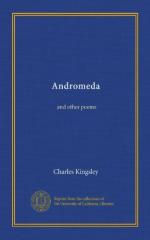He came unto the wise wife’s house:
’Now, Mother, to prove your
art;
To charm May Carleton’s merry blue eyes
Out of a young man’s heart.’
’My son, you went for a holy man,
Whose heart was set on high;
Go sing in your psalter, and read in your books;
Man’s love fleets lightly
by.’
’I had liever to talk with May Carleton,
Than with all the saints in Heaven;
I had liever to sit by May Carleton
Than climb the spheres seven.
’I have watched and fasted, early and late,
I have prayed to all above;
But I find no cure save churchyard mould
For the pain which men call love.’
’Now Heaven forefend that ill grow worse:
Enough that ill be ill.
I know of a spell to draw May Carleton,
And bend her to your will.’
’If thou didst that which thou canst not do,
Wise woman though thou be,
I would run and run till I buried myself
In the surge of yonder sea.
’Scathless for me are maid and wife,
And scathless shall they bide.
Yet charm me May Carleton’s eyes from the heart
That aches in my left side.’
She charmed him with the white witchcraft,
She charmed him with the black,
But he turned his fair young face to the wall,
Till she heard his heart-strings
crack.
1870
‘Qu’est qu’il dit’ {330}
Espion aile de la jeune amante
De l’ombre des palmiers pourquoi ce cri?
Laisse en paix le beau garcon plaider et vaincre—
Pourquoi, pourquoi demander ‘Qu’est qu’il
dit?’
‘Qu’est qu’il dit?’ Ce que
tu dis toi-meme
Chaque mois de ce printemps eternel;
Ce que disent les papillons qui s’entre-baisent,
Ce que dit tout bel jeun etre a toute belle.
Importun! Attende quelques lustres:
Quand les souvenirs 1’emmeneront ici—
Mere, grand’mere, pale, lasse, et fidele,
Demande mais doucement—’Et le vieillard,
Qu’est qu’il dit?’
Trinidad, January 10, 1870
The legend of la Brea {331a}
Down beside the loathly Pitch Lake,
In the stately Morichal, {331b}
Sat an ancient Spanish Indian,
Peering through the columns tall.
Watching vainly for the flashing
Of the jewelled colibris; {331c}
Listening vainly for their humming
Round the honey-blossomed trees.
‘Few,’ he sighed, ’they come, and
fewer,
To the cocorite {331d} bowers;
Murdered, madly, through the forests
Which of yore were theirs—and
ours
By there came a negro hunter,
Lithe and lusty, sleek and strong,
Rolling round his sparkling eyeballs,
As he loped and lounged along.
Rusty firelock on his shoulder;
Rusty cutlass on his thigh;
Never jollier British subject
Rollicked underneath the sky.




